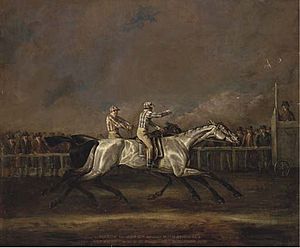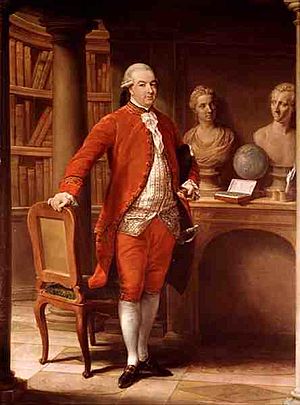Symmetry (horse) facts for kids
Quick facts for kids Symmetry |
|
|---|---|

Symmetry defeats Sorcerer at Newmarket on 30 September 1800.
|
|
| Sire | Delpini |
| Grandsire | Highflyer |
| Dam | Violet |
| Damsire | Shark |
| Sex | Stallion |
| Foaled | 1795 |
| Country | Kingdom of Great Britain |
| Colour | Grey |
| Breeder | Sir Thomas Gascoigne, 8th Baronet |
| Owner | Sir Thomas Gascoigne, 8th Baronet William Fortescue, 1st Earl of Clermont Mr Heathcote |
| Trainer | Sam King |
| Record | 13: 7-3-3 |
| Major wins | |
| St Leger Stakes (1798) Match against Sir Harry (1799) Match against Sorcerer (1800) Match against Diamond (1800) Match against Humbug (1800) |
|
Symmetry was a famous British racehorse born in 1795. He was a special type of horse called a Thoroughbred, known for speed and racing. Symmetry is best remembered for winning a very important race called the St Leger Stakes in 1798.
He started his racing career in Yorkshire, a region in England. After winning the St Leger, he went on to beat another famous horse, Sir Harry, in a special one-on-one race. Later, he moved to race at Newmarket. There, he won three more races, including exciting matches against two top horses of his time, Sorcerer and Diamond. After his racing days were over, Symmetry was sent to Russia to become a breeding horse.
Contents
About Symmetry
Symmetry was a beautiful grey horse. This means his coat was a mix of white and black hairs, making him look grey. He was bred by his owner, Sir Thomas Gascoigne, 8th Baronet.
His father, Delpini, was also a very successful racehorse. Delpini won eight races in a row! He was known for producing horses with great stamina, meaning they could run long distances. Symmetry's mother, Violet, was an excellent breeding horse. She also gave birth to another famous racehorse named Theophania, who won the Epsom Oaks race. Symmetry was one of fourteen foals born to Violet.
Symmetry's Racing Adventures
Racing as a Three-Year-Old (1798)
Symmetry's first race was on April 12 at Catterick Bridge Racecourse. He finished second in a two-mile race. Later, at York Racecourse, he raced against Lounger, a horse who had won the St Leger the year before. Symmetry ran so well that it was a dead heat, meaning they finished at the exact same time! However, Symmetry lost in the tie-breaking run-off race.
His first victory came three weeks later at Beverley Racecourse. He won a one-and-a-half-mile race against five other young horses.
After a short break, Symmetry returned to York in August. He was a favorite to win, but he finished third. Then came the big race: the St Leger at Doncaster Racecourse on September 25. Ten horses competed in this important race. Symmetry, ridden by jockey John Jackson, won the classic race! This was a huge win for Symmetry and his owner, Sir Thomas Gascoigne.
Racing as a Four-Year-Old (1799)
In August 1799, Symmetry had an exciting challenge. Sir Harry, the winner of the 1798 Epsom Derby (another very famous race), came north to race Symmetry. This was a special "match race" over four miles at York. Many people thought Sir Harry would win, but Symmetry surprised everyone and defeated him! He won a prize of 500 guineas, which was a lot of money back then. People were already excited for a rematch.
Symmetry's only other race that year was two days later. He was expected to win easily but finished last.
Racing as a Five-Year-Old (1800)
The big rematch between Symmetry and Sir Harry happened on April 28 at Newmarket. This time, Sir Harry won, taking home 200 guineas. After this race, Symmetry changed owners and joined the stable of William Fortescue, 1st Earl of Clermont.
A third match between Symmetry and Sir Harry was planned, but Sir Harry was withdrawn, so Symmetry won a prize without even having to run! In June, Symmetry finished third in a four-mile race at Bibury.
Symmetry then raced under the colors of a new owner, Mr. Heathcote. On September 30, he had another thrilling match race. He defeated Sorcerer, a very strong black horse, in a 500-guinea race. Symmetry finished his racing career with two more match race wins in October. He beat Mr. Cookson's Diamond and then successfully raced against a horse named Humbug.
Symmetry was entered in two more races the next spring, but he did not run in them.
Life After Racing: Stud Career
Symmetry never became a breeding horse in Britain. Instead, he was sold and sent to Russia. There, he became a "breeding stallion," meaning he was used to father new generations of racehorses.
Symmetry's Family Tree
Symmetry had a very interesting family tree, also called a pedigree. It shows his parents, grandparents, and even great-grandparents. This helps us understand where his speed and strength came from.
| Sire Delpini (GB) 1781 |
Highflyer 1774 |
Herod | Tartar |
|---|---|---|---|
| Cypron | |||
| Rachel | Blank | ||
| Regulus mare | |||
| Countess 1760 |
Blank | Godolphin Arabian | |
| Amorett | |||
| Rib mare | Rib | ||
| Wynn Arabian mare | |||
| Dam Violet (GB) 1787 |
Shark 1771 |
Marske | Squirt |
| The Ruby Mare | |||
| Snap mare | Snap | ||
| Marlborough mare | |||
| Syphon mare 1772 |
Syphon | Squirt | |
| Patriot mare | |||
| Charlotte | Blank | ||
| Crab mare (Family 15) |
If you look closely at Symmetry's family tree, you'll see the horse Blank appears several times. This is called inbreeding, and it means that Blank was a very important ancestor for Symmetry. Another horse named Squirt also appears multiple times in his family tree.
 | Misty Copeland |
 | Raven Wilkinson |
 | Debra Austin |
 | Aesha Ash |


